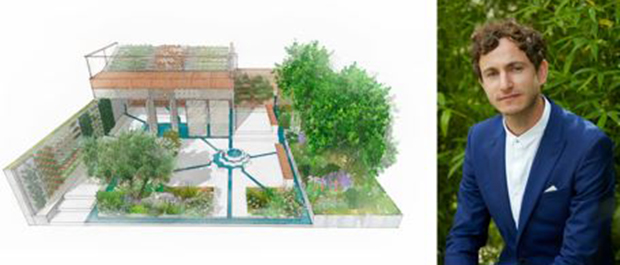
A garden inspired by the resilience, determination and ingenuity of refugees living in Domiz camp in Northern Iraq will be unveiled at the 2018 RHS Chelsea Flower Show. The Lemon Tree Trust Garden, designed with the input of refugees, is a first in the show’s 105-year history and highlights the importance of gardens and gardening to the thousands of displaced people trying to rebuild their lives with the support of Lemon Tree Trust in Domiz camp.
Exciting young designer Tom Massey debuts at the RHS Chelsea Flower Show, progressing to a 10x13m main avenue garden after two successive show gardens at RHS Hampton Court Palace Flower Show: first for The UN Refugee Agency in 2016, then charity Perennial in 2017. His design for Lemon Tree Trust reflects the hidden beauty that can be found within refugee camps. He says: “The garden is inspired by the resilience and determination of people in situations of forced migration and displacement. Their ability to make the most of harsh living conditions and landscapes, and their dedication to create gardens to grow food and beautify their limited personal space is profoundly inspiring. Gardens help to organise the chaos inherent in forced migration, while also bringing a sense of normality, wellbeing, peace and civility to broken lives.”
Massey’s design draws on elements found in the gardens of refugees displaced within Domiz camp in Northern Iraq. People need a way to bring order to a chaotic situation, as well as a space to come together as a community and to learn about horticulture and water retention. Beautiful yet drought tolerant planting will educate visitors about the type of plants and crops refugees often grow on their own plots. Ingenious vertical planting, inspired by refugees’ use of everyday objects, and designed with input from refugees themselves, provides ideas for planting in limited spaces.
Trees laden with fruit, including figs, lemons and pomegranates, provide scent and valuable crops to harvest and trade. Brutal, harsh materials, such as concrete and steel, widely available in the camps, are made beautiful with techniques such as polishing, casting and crafting into patterns and intricate Islamic inspired designs. Colourful and textural planting softens the hard materials. Cooling and calming water flows throughout the space, collected in channels and pools, recycled and pumped back through the brimming central Islamic inspired fountain, representing the importance of grey water reuse in the camps and the many makeshift fountains refuges have built in their own gardens in Domiz camp.
The Chelsea Flower Show garden marks the third year of operations for Lemon Tree Trust, which started by running garden competitions inside refugee camps and donating lemon trees as a way to build connections. Stephanie Hunt, founder of Lemon Tree Trust, explains: “In our first year, 50 families participated in the garden competition. In the second year, 150 families took part and we knew we had found something that resonated with people trying to make sense of their situation.”
The garden competition led to more ambitious and far-reaching Lemon Tree Trust projects, like the sourcing and distribution of a crisis response garden kit: an emergency ‘starter kit’ that provides wide ranging agricultural support in the form of tools, seeds and information to crisis regions in Syria and beyond. A public demonstration garden has been established in Domiz camp, and there are plans to develop a large-scale orchard and park project.
The Lemon Tree Trust has started efforts in Syria and Uganda, with Jordan, Lebanon, and Greece in the plans. Hunt added: “We are already seeing the positive social, economic, and mental health impact of green spaces, and it all started with a garden competition! We want the Lemon Tree Trust Garden at Chelsea to demonstrate the importance of horticulture and urban agriculture to the lives of displaced people and hope it will encourage visitors to the show to find out more about our work and how they can help.”
In 2017, official UNHCR figures state that the number of displaced individuals worldwide reached 65.5 million, with 22.5 million of these being refugees. This is the highest level of displacement in history, surpassing even post-World War II figures. UNHCR spokesperson Laura Padoan said: “Tom Massey’s beautiful design encapsulates a sense of community and connection with the land – elements that can be essential in helping to restore well-being for refugees. The Lemon Tree Trust is doing innovative work by bringing agriculture into camps and providing refugees with a means to start rebuilding their lives.”